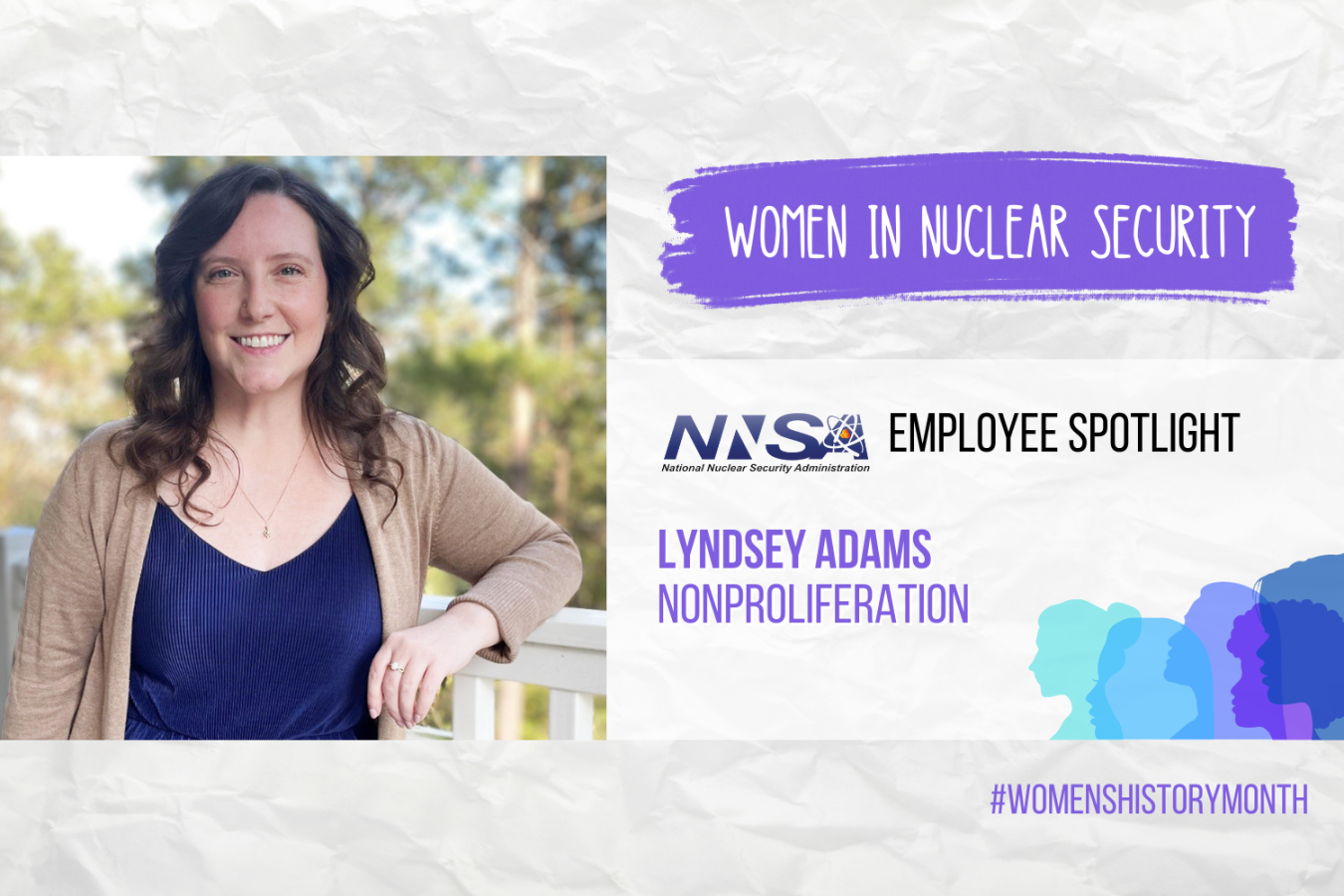Meet Lyndsey Adams. When she's not working to make the world safer by disposing of plutonium, she's probably listening to a Taylor Swift song.
National Nuclear Security Administration
March 14, 2024
How do you support NNSA?
I have a few different roles within the NNSA Office of Plutonium Disposition. I manage the financial planning and execution annually for the program, which involves interacting with many of the DOE labs, plants, and sites as well as other NNSA offices. I’m also involved in the safeguards and security planning for downblending surplus plutonium and shipping it to the Waste Isolation Pilot Plant for final disposition.
What is your personal background, and how has that shaped you and your approach to your career?
I grew up in a rural area of northeast Georgia in a small family. My parents didn’t go to college but were small business owners who instilled a strong work ethic and values in my brother and me. They encouraged us to pursue all the educational opportunities we could, and I am a proud first-generation college graduate and the only one in my family with a master’s degree. My love of learning and knowledge, and that work ethic, is something that continues to drive me in my career.
It’s important to me to do what I can to make the world even just a little bit safer, so playing a part in dispositioning surplus plutonium after decades of DOE and NNSA efforts towards this mission makes me very proud to be a part of the team.
What did you study in school and how did it impact you personally and professionally?
I earned my Bachelor of Arts in anthropology at the University of Georgia (Go Dawgs!) before getting my Master of Arts in international security at the University of Denver. While at the University of Georgia, I had the opportunity to travel and engage with other cultures and experiences, including a study abroad in Croatia that focused on the contributing events and aftermath of the Yugoslav wars. Speaking with and learning from people that lived through those conflicts is the main reason I decided to pursue my master’s degree.
What led you to a career in nuclear security?
Prior to grad school, I had very little awareness of NNSA or the nuclear security field, but I was always interested in security studies and international relations. Exposure to U.S. nuclear policy and subject matter experts piqued my interest, and I applied to the NNSA Graduate Fellowship Program and was accepted as a fellow in 2015.
What is the best part about your job?
I love that every day is a little bit different. Working in a program that spans decades includes a lot of moving parts that impact day-to-day activities as well as the long-term mission. It’s a bit like solving small parts of a much larger and more complicated puzzle!
What is your proudest accomplishment while working at NNSA?
It’s important to me to do what I can to make the world even just a little bit safer, so playing a part in dispositioning surplus plutonium after decades of DOE and NNSA efforts towards this mission makes me very proud to be a part of the team.
Tell us something interesting about yourself.
I am a Taylor Swift fan (hi fellow Swifties!) and two of my grad school friends and I are traveling to see her Eras Tour in Stockholm, Sweden this year! I love traveling, so in addition to seeing an amazing concert, I’m really excited to spend some time in Scandinavia.
In addition to traveling internationally, I also love visiting the Rocky Mountain states. In college, I spent two weeks at Glacier National Park in Montana and after graduating I got a job working at a hotel in Yellowstone National Park so I could spend the summer in Montana and Wyoming. And then I ended up in Colorado for grad school – there may be a theme!
... Seeing the first shipment of downblended surplus plutonium leaving the Savannah River Site for the Waste Isolation Pilot Plant and knowing that I played a part in permanently disposing of weapons-usable nuclear material was pretty incredible.
Do you have any highlights from your time supporting NNSA?
I’ve had the opportunity to experience some really cool things so far in my career, but seeing the first shipment of downblended surplus plutonium leaving the Savannah River Site for the Waste Isolation Pilot Plant and knowing that I played a part in permanently disposing of weapons-usable nuclear material was pretty incredible.
What advice would you have for anyone interested in a career in STEM?
Don’t doubt yourself or tell yourself that this field isn’t for you – everyone has a place in STEM! We are often our own harshest critics, downplaying our abilities and expertise, instead of being our biggest encouragers. I was intimidated by advanced science and math growing up, but now learning new science is one of my favorite parts of my job!
Who is someone that inspires you and why?
I am constantly inspired by the amazing women I work with every day. My office is full of strong, talented women with decades of experience in DOE and NNSA who willingly invest their time and resources to mentor me, and I am immensely grateful for their career and personal guidance.
How do you plan to celebrate/commemorate Women’s History Month? Does this celebration have special meaning to you?
Women’s History Month is an opportunity for reflection and acknowledgment of the women who have come before me and their achievements in all facets of life. I am grateful for the opportunities I have because of them and recognize that there is more work to be done for the generations after me.

